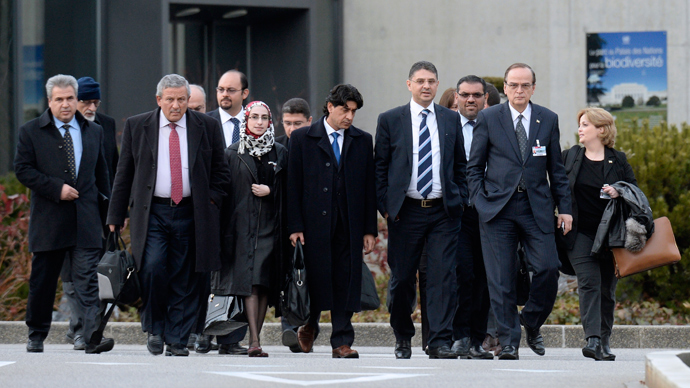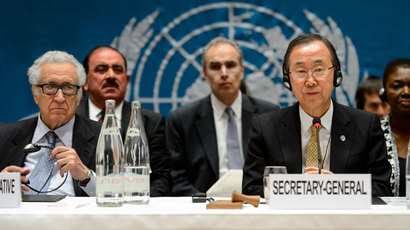‘No scuffle, no communication’ between Syria foes in Geneva - Lavrov

Though representatives of Syrian President Bashar Assad and opposition forces exchanged bitter and emotional open statements at the Geneva 2 talks, they have so far failed to actually communicate, Russian Foreign Minster Sergey Lavrov said on Saturday.
“There was no scuffle there. I haven’t noticed communication either,” Lavrov told a Russian TV channel while commenting on the situation at the long awaited talks in Switzerland’s Montreux.
Statements from the government and the Western-backed National Coalition “were both harsh and emotional,” Lavrov said. During the first day of talks on January 22, representatives of the two sides sat across from each other but “I believe they were both looking in the texts [of their speeches],” the Russian top diplomat stated.
The Geneva 2 talks were initially proposed by Russia and the US in May 2013.
“The fact that more than eight months passed since the Russian-American initiative was put forth on May 7, 2013 indicates that even with the political will of Moscow and Washington things are not moving as fast as we would like,” Lavrov said.
Dialogue between the Syrian government and opposition needs to be enlarged to make it “truly representative,” the minister added.
The conference - which has brought together representatives of about 40 states, along with the UN, the EU, the Arab League, and the Organization of Islamic Cooperation - has so far yielded little result, with both sides refusing to budge on key issues.
However, simply managing to bring both sides to the talks has been seen as a sign of significant success on the road to end the country’s civil war.
Following Wednesday's initial meeting, which involved speeches from foreign ministers, it was agreed that the government and opposition delegations would hold direct talks on Friday. But it wasn’t until Saturday - after a day of accusations and delays - that the foes finally faced each other at the negotiating table at the United Nations headquarters in Geneva.
The two parties sat in silence for half an hour while UN mediator Lakhdar Brahimi set out his plans, which included an immediate focus on humanitarian aid followed by political talks to resolve the conflict, Reuters reported. Both sides then left the room through different doors. The two sides were not expected to directly speak at the meeting.
“We haven't achieved much but we are continuing,” Brahimi said, wrapping up the meeting later on Saturday. He described the progress as being “half-steps” rather than steps, but added that the talks will continue.
The opposition delegation hopes to reach a short ceasefire agreement on Sunday, which would allow a humanitarian convoy to move into the besieged rebel-held areas in the city of Homs, western Syria.
"We are focusing on opening humanitarian corridors to allow food and medicine to arrive to people. There are areas in Syria that haven't seen any food and medicine for the last eight months,” Syrian National Coalition spokesman Louay Safi said after the meeting, AP reported.
The Saturday and Sunday consultations are being held as a prelude to peace talks on January 26.
“Negotiations will start on Monday and these negotiations are about forming a transitional governing body,” Safi said.














